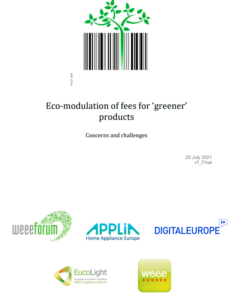 14/12/2021
14/12/2021The European Commission’s draft Guidelines on the “general minimum requirements for Extended Producer Responsibility (EPR) schemes” set out in Directive 2018/851/EU aim to facilitate the adaptation of EPR schemes to new requirements concerning eco-modulation of fees by providing guidance to support their harmonised interpretation and application across the EU. They say: “Harmonised and effective implementation of these requirements should support level playing field and provide investment certainty, in particular, in separate collection, sorting and recycling, which will then go counter to the intended harmonisation and to increasing the effectiveness of such schemes across the Union.”
In response to these Guidelines, the WEEE Forum set up, towards the end of 2020, a multi-stakeholder task force, including APPLiA and individual producers representative of DIGITALEUROPE, the sector’s producer associations, as well as the forty-five producer responsibility organisations (PRO) in the WEEE Forum, to proactively develop a preferred framework, principles, and mechanisms for a harmonised eco-modulated fee scheme in Europe and to assess its economic impact.
In July 2021 the task force came to the following chief conclusion:
It is impossible to have a wide, comprehensive, and ambitious scheme where EPR financial contributions do not exceed “the costs that are necessary to provide waste management services in a cost-efficient way” (as stipulated in legislation), and yet has a discernible effect on consumer and producer behaviour.
Other findings:
- Considering a range of products that account for four-fifths of sales and three quarters of the waste generated, there is very little room to reduce technical treatment costs through treating ‘greener’ products. Even for those products that have more room to reduce technical treatment costs, the incidence is below €3 per product. There are huge limitations to delivering product or consumer change through eco-modulation.
- Modulating compliance treatment fees, which represent less than 2% of the individual product price value, is very limited as an effective instrument to drive consumer behaviour towards ‘greener’ products.
- Consumers consider a range of factors when comparing between products to purchase. Where a visible fee is already payable, it does not seem to influence purchasing behaviour. Moreover, consumers have a perception that green products are more expensive, but implementation of eco-modulation should lead to a lower product price. How product price influences consumer behaviour is complex and understanding it requires more research.
- Eco-modulation has been in operation in France for ten years. It is not possible to ascertain the impact of the eco-modulation scheme on manufacturers’ decisions to make their products ‘greener’. Producers also report that the scheme is over-complicated. This gives weight to the need for simplicity and harmonization to derive impact; the scheme must be improved.
- If countries in Europe decide to roll out eco-modulation schemes, measures must be taken to ensure that there is harmonization across the EU.
- The Sustainable Products Initiative (SPI) aims to make ecodesign principles deliver on sustainability, including circularity. The SPI aims to further develop ecodesign requirements on material efficiency aspects: durability, reliability, reparability, upgradability, recyclability, hazardous substance, recycled content and design for disassembly. These elements are similar to the criteria set by Article 8a(4)(b) of the Waste Framework Directive aiming at creating incentives for manufacturers to design greener products for mitigating the environmental impacts. The Commission believes that eco-modulation will supplement the SPI, but the concern is that it may give rise to inconsistencies or confusion instead. Hence, there are a number of safeguards that the Commission must put in place to harmonise eco-modulation and avoid too many disparate schemes. Criteria on reparability, durability, recyclability, and reusability are already addressed by the current Ecodesign Directive, with new resource efficiency requirements related to the reparability and recyclability of several products entered into force in March 2021.
- The guiding principles for the EU and the Member States should be harmonisation, progressivity, simplicity, limited scope, and additionality.
Read more:
‘Eco-modulation of fees for ‘greener’ products‘
Eco-modulation_Annex I_Directive 2018.851.EU_Article 8a4
Eco-modulation_Annex II_Eco-modulation_Sofies study_Economic assessment
Eco-modulation_Annex III Consumer Survey 2021
Eco-modulation_Annex IV Synthèse étude Modulation OCAD3E EN
Eco-modulation_Annex V Eco Modulation Joint Industry Comments 2019
Eco-modulation_Annex VI Eco Modulation EucoLight Study 2020
About
The WEEE Forum a.i.s.b.l. is an international association representing 51 producer responsibility organisations across the globe. Together with our members, we are at the forefront of turning the extended producer responsibility principle into an effective electronic waste management policy approach through our combined knowledge of the technical, business and operational aspects of collection, logistics, de-pollution, processing, preparing for reuse and reporting of e-waste. Our mission is to be the world’s foremost e-waste competence centre excelling in the implementation of the circularity principle.
Transparency Register ID 702397445-73.
Copyright 2019 All Rights Reserved
Contact
BluePoint conference and
business centre
Boulevard Auguste Reyerslaan 80
B-1030 Brussels
Belgium
Newsletter
Subscribe to our mailing list to get the updates to your email inbox.